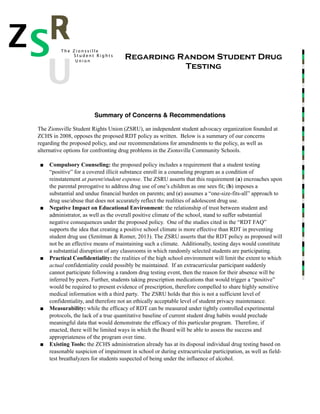
ZSRU_Summary_RDT
- 1. ! ! ! ! ! ! ! ! !!! Summary of Concerns & Recommendations! ! The Zionsville Student Rights Union (ZSRU), an independent student advocacy organization founded at ZCHS in 2008, opposes the proposed RDT policy as written. Below is a summary of our concerns regarding the proposed policy, and our recommendations for amendments to the policy, as well as alternative options for confronting drug problems in the Zionsville Community Schools. ! ■ Compulsory Counseling: the proposed policy includes a requirement that a student testing “positive” for a covered illicit substance enroll in a counseling program as a condition of reinstatement at parent/student expense. The ZSRU asserts that this requirement (a) encroaches upon the parental prerogative to address drug use of one’s children as one sees fit; (b) imposes a substantial and undue financial burden on parents; and (c) assumes a “one-size-fits-all” approach to drug use/abuse that does not accurately reflect the realities of adolescent drug use. ■ Negative Impact on Educational Environment: the relationship of trust between student and administrator, as well as the overall positive climate of the school, stand to suffer substantial negative consequences under the proposed policy. One of the studies cited in the “RDT FAQ” supports the idea that creating a positive school climate is more effective than RDT in preventing student drug use (Sznitman & Romer, 2013). The ZSRU asserts that the RDT policy as proposed will not be an effective means of maintaining such a climate. Additionally, testing days would constitute a substantial disruption of any classrooms in which randomly selected students are participating. ■ Practical Confidentiality: the realities of the high school environment will limit the extent to which actual confidentiality could possibly be maintained. If an extracurricular participant suddenly cannot participate following a random drug testing event, then the reason for their absence will be inferred by peers. Further, students taking prescription medications that would trigger a “positive” would be required to present evidence of prescription, therefore compelled to share highly sensitive medical information with a third party. The ZSRU holds that this is not a sufficient level of confidentiality, and therefore not an ethically acceptable level of student privacy maintenance. ■ Measurability: while the efficacy of RDT can be measured under tightly controlled experimental protocols, the lack of a true quantitative baseline of current student drug habits would preclude meaningful data that would demonstrate the efficacy of this particular program. Therefore, if enacted, there will be limited ways in which the Board will be able to assess the success and appropriateness of the program over time. ■ Existing Tools: the ZCHS administration already has at its disposal individual drug testing based on reasonable suspicion of impairment in school or during extracurricular participation, as well as field- test breathalyzers for students suspected of being under the influence of alcohol. Regarding Random Student Drug Testing Z R U T h e Z i o n s v i l l e S U n i o n S t u d e n t R i g h t s S
- 2. ■ Other practical concerns: treatment of “diluted” samples (i.e. will a “diluted” or “invalid” sample be treated as “positive” until proven otherwise?); how students with excused absences (illness, college visits, field trips, etc.) be included in the RDT sample? ! The Zionsville Student Rights Union recognizes the need for confronting student drug use whenever it arises, and proposes the following alternatives to the proposed policy as written (these suggestions vary in level of departure from the proposed plan): ! ■ That the information arising from drug tests be shared directly between Midwest Toxicology and student and parents, and that school officials not be privy to that information; ■ This would change the practical effects and public perceptions of the program from adversarial and punitive (although not academically so) to “school as facilitator” of a tool for parents and students to utilize as they see fit. ■ This type of approach is already provided for in ZCHS handbook (pp. 9-10 of the online version currently posted). We propose similar protocol to that described in the handbook, while compelling athletes and extracurricular participants to be included in the pool, and the school shouldering the costs of testing. ■ That the mandatory counseling requirement be removed; ■ That the necessity of counseling be assessed by an objective and qualified third party on a case-by- case basis at the school’s expense (with monies from the vending/concessions fund); ■ That if mandatory counseling is not removed, the school allocate monies from the vending/ concessions fund to assist families with the cost of counseling; ■ That any RDT policy enacted require the dates of testing events to be selected at random, rather than at the ZCHS administration’s discretion (i.e. the ZCHS administration picks the number of tests for which to budget, and the dates themselves are randomly selected); ■ Should a randomly selected date conflict with a major academic event, such as AP exams or finals, the ZCHS administration would have the discretion to randomly select an alternative date. ■ That the funds proposed to be allocated for RDT be assigned to investigation of more effective means of confronting drug issues through comprehensive drug education ! In sum, the Zionsville Student Rights Union urges the Board to consider all viable alternatives to the random drug testing regime proposed before committing the Zionsville Community Schools to such a substantial departure from current standard operating procedures and organizational values. ! The ZSRU therefore implores the Board to table this issue until such a time that more comprehensive public opinion may be understood and all options for confronting student drug use can be considered publicly.